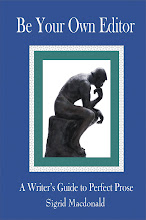Often written dialogue sounds more realistic
with double negatives, especially if you are quoting people who are
deliberately misspeaking such as teenagers who know better but are trying to
sound cool, or people who are accidentally misspeaking such as those with
English as a second language.
The other time that I like double negatives for
writers is for emphasis. I was listening to a song by Boyzone yesterday (yes, I
know, a boy band, slightly higher on the totem pole than Backstreet Boys, whom
I also like, for the record. So, shoot me.) and they sang the following line: "I'll
never not need you." Those words kept going around and around in my head,
not just because I'm a writer and an editor and double negatives pop out at me
like a caterpillar crawling through a Caesar salad but also because of the
impact the line made. Never not need you. It sounded so romantic, much more so
than "I'll always need you."
So, double negatives aren't always taboo, but in general they are something we want to avoid. The trick about using them is to know the rule first – that they are not grammatically correct – and then feel free to break that rule if you have good reason.
Sigrid Macdonald is the author of
five book and a manuscript editor. You can find her at http://sigridmacdonald.blogspot.com/


